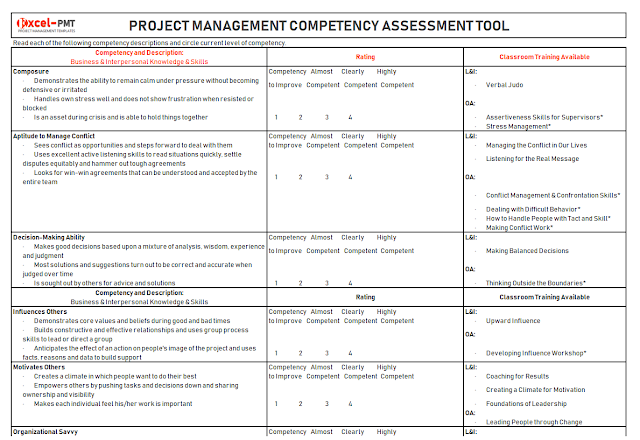- Composure
- Aptitude to Manage Conflict
- Decision-Making Ability
- Influences Others
- Motivates Others
- Organizational Savvy
- Inspires Ownership and Commitment
- Problem Solving Ability
- Strategic Communicator
- Team Manager
- Capacity to Execute
- Budget and Fiscal Capacity
- Contracting Process
- Defining Work
- Managing Project Parameters
- Project Performance
- Project Planning
- Risk Management
Here you can see below the full description of each competency require for the project management. Let’s see full description of each:
1. Composure
- Demonstrates the ability to remain calm under pressure without becoming defensive or irritated
- Handles own stress well and does not show frustration when resisted or blocked
- Is an asset during crisis and is able to hold things together?
2. Aptitude to Manage Conflict
- Sees conflict as opportunities and steps forward to deal with them
- Uses excellent active listening skills to read situations quickly, settle disputes equitably and hammer out tough agreements
- Looks for win-win agreements that can be understood and accepted by the entire team
3. Decision-Making Ability
- Makes good decisions based upon a mixture of analysis, wisdom, experience and judgment
- Most solutions and suggestions turn out to be correct and accurate when judged over time
- Is sought out by others for advice and solutions
4. Influences Others
- Demonstrates core values and beliefs during good and bad times
- Builds constructive and effective relationships and uses group process skills to lead or direct a group
- Anticipates the effect of an action on people's image of the project and uses facts, reasons and data to build support
5. Motivates Others
- Creates a climate in which people want to do their best
- Empowers others by pushing tasks and decisions down and sharing ownership and visibility
- Makes each individual feel his/her work is important
6. Organizational Savvy
- Is sensitive to how people and organizations function
- Maneuvers through complex political situations effectively and quietly
- Anticipates where the landmines are and plans his/her approach accordingly
7. Inspires Ownership and Commitment
- Sets challenging goals for self and others and expects high performance and quality outcomes
- Requires compliance with project standards
- Accepts overall responsibility for success or failure of the project
8. Problem Solving Ability
- Defines problems and identifies root causes
- Verifies assumptions and conducts risk assessment
- Facilitates group problem solving
9. Strategic Communicator
- Keeps key stakeholders informed regarding project status, milestone performance, meeting notifications and outcomes and other needed information
- Orchestrates communication so that it is understood, timely and meaningful to team members, project sponsors and other stakeholders
- Provides communication is that both strategic and tactical
10. Team Manager
- Blends people into teams when needed and defines team goals, responsibilities and measurements for success
- Creates a spirit and feeling of belonging in his/her team
- Let’s people be responsible for their work while holding them accountable
11. Capacity to Execute
- Marshals resources (people, funding, material, support) to get things done and uses them effectively and efficiently
- Orchestrates multiple activities at once to accomplish a goal
- Keeps people focused on the most important goals and translates them into specific actions that can be broadly understood
- Continually and publicly measures and assesses project status and performance against visible standards
- Consistently holds people accountable
12. Budget and Fiscal Capacity
- Develops realistic budgets and guides work within budgetary constraints
- Is sensitive to the agency's various funding streams, fiscal periods and restrictions
13. Contracting Process
Uses specifications, deadlines, incentives and penalties to obtain vendor services and deliverables14. Defining Work
Uses a work breakdown structure to identify, organize and schedule tasks to ensure timely completion15. Managing Project Parameters
- Works with all levels of stakeholders to define project goal, requirements and scope
- Leads a requirements gathering session so that identification of requirements can be completed and approved
16. Project Performance
- Manages a project by measuring and monitoring status/performance
- Takes corrective actions as and when required
- Prioritizes unexpected tasks and issues and manages important tasks simultaneously
17. Project Planning
- Estimates work effort and resources required using input from subject matter experts, work breakdown structures and questioning techniques
- Determines workflow and critical path
18. Risk Management
- Identifies, evaluates and manages project risks
How to use this assessment tool?
Actually, this template is made with three different and specific parts:
- Competency and description - That is describing the interpersonal knowledge and skills.
- Rating - This section has five different sub-fields those are: (1) Competency to improve (2) Almost competence (3) clearly competent (4) Highly Competent
- Training part - Here you can describe the actual condition of the training i.e. description of the training.
Usually, the assessment tools are exercise for verification of the individual competence for the particular task. Hence, when you are doing project management competence, you have to rate each individual for the appropriate subject and skills. Here as above example picture you can see for will make easier to understand, how to filling this template at on actual training program.








How can I download this template?
ReplyDeleteIs this available for download and use?
ReplyDelete